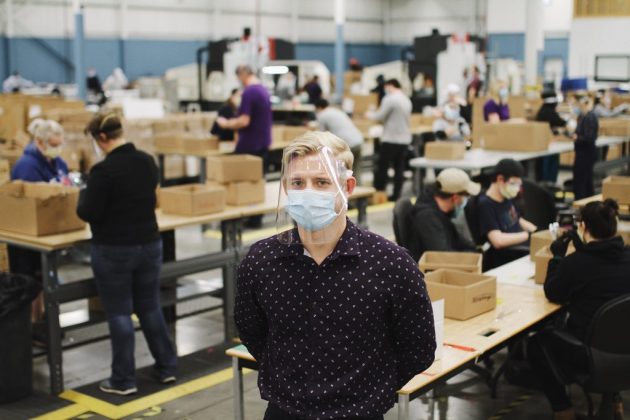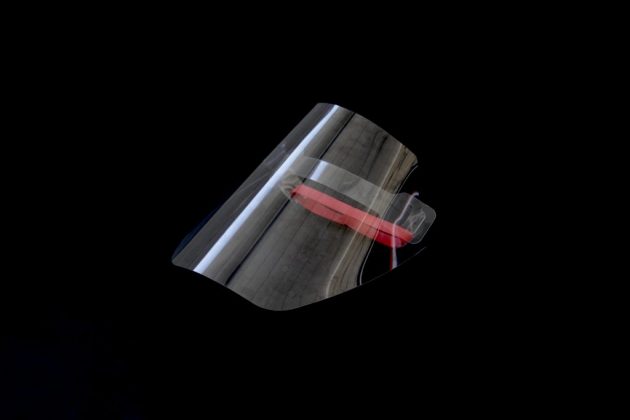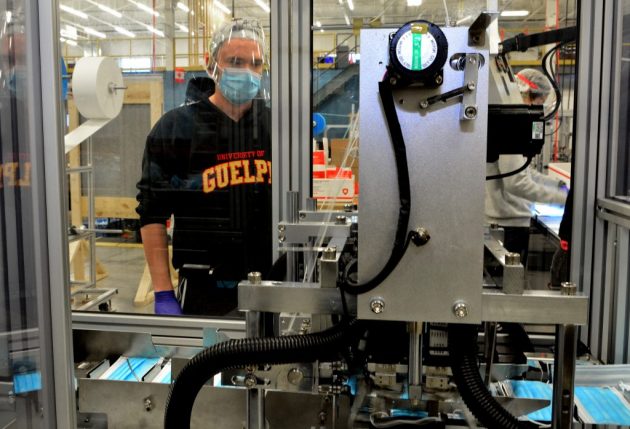
A COVID Hero: Canadian Shield’s Pandemic Journey
by Alanna Fairey, Associate Editor
A manufacturer of education technology retools to make a big contribution to face shield production

Jeremy Hedges on the plant floor wearing the Canadian Shield face shield and a mask.
PHOTO: CANADIAN SHIELD
Jeremy Hedges may be just 27-years-old, but he has always understood what it means to be a leader and that confidence led to the creation of The Canadian Shield, one of the earliest responders to the COVID-19 pandemic fight, filling the need for personal protective gear.
The company now produces reusable protective face shields and was recognized for its efforts at the “Responding to COVID-19: Industry Leadership Honours” event. This virtual event on Sept. 17 was hosted by Canadian Manufacturing, PLANT and EP&T magazines.
Sponsored by Machines Italia, the Association for Manufacturing Excellence (AME) and Wello, the COVID awards honoured manufacturers from across Canada that went above and beyond to help out as the COVID-19 pandemic escalated across Canada.
The Canadian Shield won the Personal Protective Equipment (PPE) – large manufacturer and the Ultimate COVID Hero awards.
The Hero award recognized Canadian Shield for having the most significant impact overall through the scope of its efforts, ingenuity and challenges it overcame, all within a few months. So how did this big result spring from InkSmith, a small company (about eight employees) making educational materials for schools?
Hedges traces his leadership instincts and the need to make a difference in the community to his youth.
Growing up in Cambridge, Ont., he was heavily involved in athletics and student leadership when he attended Preston High School and Wilfrid Laurier University, where earned a degree in international development and politics. He credits his university studies for giving him a sense of the challenges and hardships people face around the world.

The Canadian Shield face shield.
PHOTO: CANADIAN SHIELD
“I’ve always had a knack for entrepreneurship,” Hedges says. “While I was in university, I worked in sales and marketing roles, and as an IT recruiter. From a pretty early age, I always knew I wanted to be an entrepreneur.”
Almost immediately after graduating in 2016, Hedges launched his first company, the Waterloo, Ont.-based InkSmith. It works with school boards across Canada to create meaningful learning experiences by bringing technology into the classroom. InkSmith designs tools such as 3D printers, robotics kits and laser cutters used to make tech tools for building critical thinking skills.
The Climate Action Kit teaches students about climate change issues in the context of their possible solutions, Hedges explains. “Students might learn about deforestation and then design, build and code an automated tree planter.”
A call to action
Although the world shut down on March 20 because of the pandemic, Hedges became aware of the virus in early January through overseas connections.
“They were sounding the alarm in China about how dire things were looking,” Hedges says. “March 20 was probably our second or third day shutting down because we were going into lockdown.”
A local doctor reached out to Hedges and his team a short time later, looking for support to print ventilator pieces. “I told him that we didn’t really have the technology to print ventilators, ” Hedges recalls. “But I’d been following a group of innovators out of the Czech Republic doing face shields.”
The next day, the doctor said the Waterloo Region was short an astronomical 10,000 face shields, so Hedges decided to take on the challenge.
“We weren’t thinking we were starting a new business,” Hedges recalls. “We just thought, ‘we have the tools, we can jump in and help our community – let’s do this.’”
And thus, The Canadian Shield was created.
At the height of the pandemic, the new company began manufacturing the clear plastic Canadian Shield face protector for frontline workers, providing coverage against exposure to coronavirus droplets from ear-to-ear, and hairline to neck. By May, the company had launched consumer sales online.

A machine attendant monitors the mask ear-loop welding process.
PHOTO: STEPHEN URHANEY
Production pain points were speed of production, access to source materials, keeping costs low, and complementing existing PPE kits. In addition, Canadian Shield launched consumer sales for its products online in May.
Working long days in the initial first few weeks, his team had the tools to laser cut the face shields, and Hedges put out a call on Twitter looking for someone to print the headbands.
Conversations about the overall PPE shortage in Ontario and across Canada soon followed. Within days, he had contracts for hundreds of thousands of shields.
The company went through what Hedges describes as “radical transformations,” shifting from focusing exclusively on 3D printing and laser cutting to stamping, and then purchasing automated travelling head cutting presses. “That took us from being able to do thousands or in the low tens of thousands of shields a day to hundreds of thousands a day.”
Working 16- to 24-hour days, production ramped up fairly quickly – so much so that Canadian Shield received its medical device licence in four days, when the average wait time is about 120 days.
The company moved from a 2,500 square-foot space to a 50,000 square-foot building – sight unseen when Hedges signed the lease – within four weeks, to create a fully operational manufacturing facility.
“There’s no real book on how to operate during COVID,” he says with a laugh.
Once the space was secured, he began hiring staff (now more than 300 on the payroll) that could not only help scale up production, but who also had a strong understanding of the job’s purpose.
“We had to build a solid management team so we put out job advertisements for general labour roles and we got 6,000 applicants in a span of three months. What was really rewarding is they all knew what we were doing, that it was mission-driven and they wanted to be part of something. We were making products for the frontline and people were excited to get to work.”
The team’s enthusiasm and desire to do the right thing was noticed.
In April, Canadian Shield announced Public Services and Procurement Canada (PSPC) had awarded it a contract to manufacture 10 million units of its reusable face shields for healthcare providers and essential workers by August.
Hedges credits the support of his team, and the support of the community.
“The Kitchener-Waterloo community and particularly [tech start-up] Communitech has been an incredible supporter,” Hedges says. “We owe them our success and have to make sure they share the spotlight.”
A bright future
To date, Canadian Shield has donated more than 68,000 face shields to over 143 organizations in nine provinces and territories.
In addition, Canadian Shield launched a “Buy One Get One” campaign on its website. For every shield purchased online, one is donated to healthcare facilities in need.
Through this initiative, the company has donated more than 900,000 face shields that have gone to teachers across Canada.
When COVID-19 is over, there will always be a need for face shields, medical masks and other forms of PPE.
“Volumes will decline. It’s not always going to be astronomical numbers like we’re seeing today,” Hedges explains. “I think Canada’s total demand for masks in the next year is between 1.5 billion and 2 billion. Probably during a normal year that number is closer to 200 million. So there’s going to be a sustainable market there.”
Even so, the company’s capacity is going to be much greater than what’s needed to support Canada. “The long-term plan is to expand and get as much global market share as possible. The only way we can do that is by being vertically integrated and highly automated. In that way, we’ll get our cost centres down so we can compete dollar-for-dollar against countries like China.”
The company is now producing cloth and surgical mask lines, ramping up to more than 300 million per year.
Hedges also sees the company selling raw material for making masks. He’s thinking green too, but the focus will continue to be on helping those in need.
“We’re investing in making masks compostable. We’ll sell the automation to make masks, we’ll sell masks, and we’ll sell the raw material that we can to help other countries in whatever way they need.”
Naturally, Hedges the entrepreneur is thinking big.